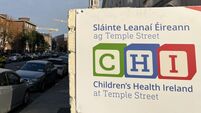Most homeless services still at maximum capacity

The latest reports from the Department of Housing showed that homeless services in every part of the country is close to or at maximum capacity. File Picture.
Three regions still had an average of more than one new homeless presentation every day during the third quarter of this year, new figures reveal.
Quarterly progress reports published by the Department of Housing also show that every area was either close to or at full capacity in the period of July to September, despite an overall downward trend in the number of people in emergency accommodation so far this year.
Over the three-month period, Dublin had 750 new homeless presentations, a daily average of approximately eight people presenting as homeless for the first time over the period and representing an increase from the second quarter of this year.
In the South West, which includes Cork, there was 105 new homeless presentations. The third region to see more than one new presentation a day over the three-month period was the North East, which had 162.
New presentations were dwarfed by the number of repeat presentations in every area.
In Dublin, 5,564 adults accessed emergency accommodation over the third quarter of the year, 4,814 of whom were repeat or existing service users.
Of the 4,112 adult beds available in emergency accommodation in the capital on the last day of the quarter, just five bed were unused.
The average nightly placement rate into emergency accommodation or night services for adults using the local authority placement service and the homeless freephone was 132.
The Dublin report also found that 69% of those in emergency accommodation had been living there for six months or more and are considered to be experiencing long-term homelessness — the same percentage as two years ago.
The report said "work is ongoing to end the use of commercial hotels as a form of emergency accommodation and to ensure homeless individuals are accommodated in suitable accommodation designated for homeless services".
In the South West, 284 people had been in emergency accommodation for more than six months in the past year, either consecutively or cumulatively, with 175 in private emergency accommodation such as in hotels.
While in Dublin and some other regions the most likely destination out of homeless accommodation was to new or private accommodation, in the South West 111 did so but where another 114 people went on leaving emergency accommodation was described as 'unknown'.
In the South East, of the 44 people leaving emergency accommodation, just five entered new accommodation, whereas 27 moved in with family/friends. In the North West 134 people moved on from emergency accommodation but just 21 to new accommodation, versus 27 who went to ive with friends and family. In the same area 'unknown discharge' was referenced in 62 cases.
The Midlands report said: "There is a growing use of hotel/B&B accommodation and key working cannot form part of these placements, due to resource issues."





